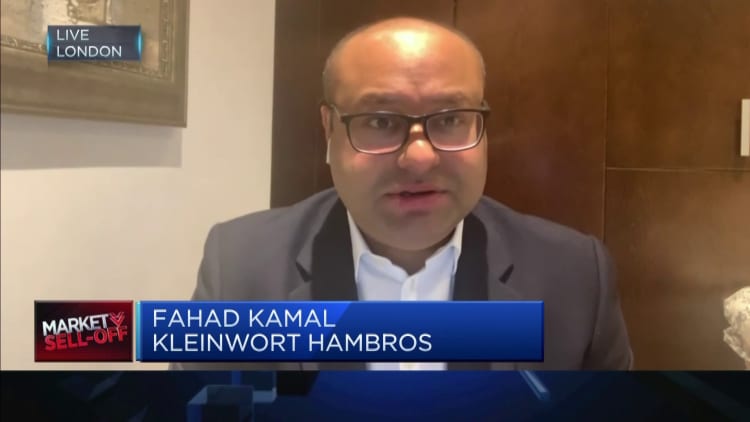Pound tanking, massive tax cuts and talk of emergency rate hikes
Britain’s Prime Minister Liz Truss and Britain’s Chancellor of the Exchequer Kwasi Kwarteng.
Dylan Martinez | Afp | Getty Images
LONDON – The first fiscal policy announcement from new British Prime Minister Liz Truss’s government has been met with one of the most pronounced market sell-offs in recent history.
The British pound hit an all-time low against the dollar in the early hours of Monday morning, dropping below $1.04, while the U.K. 10-year gilt yield rose to its highest level since 2008, as disarray continued following Finance Minister Kwasi Kwarteng’s “mini-budget” on Friday.
Jim O’Neill, former Goldman Sachs Asset Management chairman and a former U.K. Treasury minister, said the pound’s fall shouldn’t be misinterpreted as dollar strength.
“It is a consequence of an extremely risky budget by the new chancellor and a rather timid Bank of England that, so far, has only raised rates reluctantly despite all the clear pressures,” he told CNBC Monday.
The announcement Friday featured a volume of tax cuts not seen in Britain since 1972 and an unabashed return to the “trickle-down economics” promoted by the likes of Ronald Reagan and Margaret Thatcher. The radical policy moves set the U.K. at odds with most major global economies against a backdrop of sky-high inflation and a cost-of-living crisis.
The fiscal package – which includes around £45 billion in tax cuts and £60 billion in energy support to households and businesses over the next six months – will be funded by borrowing, at a time when the Bank of England plans to sell £80 billion in gilts over the coming year in order to scale back its balance sheet.
The rise in 10-year gilt yields above 4% could suggest the market expects that the Bank will need to raise interest rates more aggressively in order to contain inflation. The yield on 10-year gilts has risen 131 basis points so far in September — on course for its biggest monthly rise recorded within Refinitiv and Bank of England data going back to 1957, according to Reuters.

Truss and Kwarteng maintain that their sole focus is to boost growth through tax and regulatory reform, with the new finance minister suggesting in a BBC interview on Sunday that more tax cuts could be on the way. However, the plan has drawn criticism for disproportionately benefiting those with the highest incomes.
The independent Institute for Fiscal Studies also accused Kwarteng of gambling the U.K.’s fiscal sustainability in order to push through huge tax cuts “without even a semblance of an effort to make the public finance numbers add up.”
As the markets continue to balk at the new prime minister’s plans, Sky News reported on Monday morning that some Conservative Members of Parliament are already submitting letters of no confidence in Truss – only three weeks into her tenure – citing fears that she will “crash the economy.”
‘Currency crisis’
Vasileios Gkionakis, head of European FX strategy at Citi, told CNBC on Monday that the massive fiscal stimulus and…
Read More: Pound tanking, massive tax cuts and talk of emergency rate hikes
